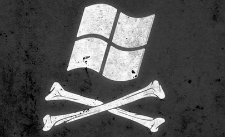 When Windows 10 was launched last year, rumors spread that the operating system was equipped with a built-in piracy kill switch.
When Windows 10 was launched last year, rumors spread that the operating system was equipped with a built-in piracy kill switch.
According to some reports, this would allow Microsoft to nuke all torrents downloaded from The Pirate Bay, and more. A scary outlook, but also a massive exaggeration, for now.
The controversy originated from a single line in Microsoft’s Service Agreement which allows the company to download software updates and configuration changes that may prevent people from “playing counterfeit games.”
Technically this allows Microsoft to block people from playing pirated games across Windows 10 and other services, but thus far there is no indication that this is happening.
However, this week the issue was highlighted again in a report published by Black Market Watch and the Global Initiative against Transnational Organized Crime, which made several recommendations on how online piracy could be tackled in Sweden.
While most of the media attention focused on the role of ISPs, there is an even more controversial proposal that has been largely overlooked. According to the report, pirated content should be banned on the operating system level.
“Other players that possess the potential ability to limit piracy are the companies that own the major operating systems which control computers and mobile devices such as Apple, Google and Microsoft,” one of the main conclusions reads.
“The producers of operating systems should be encouraged, or regulated, for example, to block downloads of copyright infringing material,” the report adds.
The report references last year’s Windows 10 controversy, noting that these concerns were great enough for some torrent sites to block users with the new operating system.
While Sweden doesn’t have enough influence to make an impact on these global software manufacturers, applying pressure through the international community and trade groups may have some effect.
“Sweden’s ability to influence this as a single state is small, but it can take action through the EU and the international community. Copyright holders can also play a role in promoting this through international industry associations,” the report notes.
For now, it’s unlikely that the plan will become reality in the near future.
Yesterday, Swedish ISP Bahnhof responded to the report by saying that it doesn’t want to act as piracy police, and Apple, Google and Microsoft are not going to be happy with this role either.
However, it’s clear that anti-piracy proposals are getting more extreme year after year.
[Source: TF]




